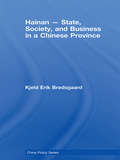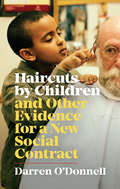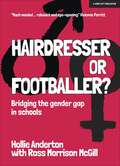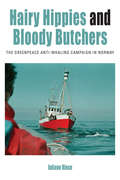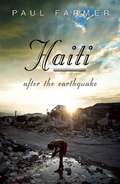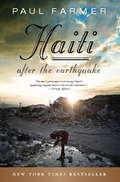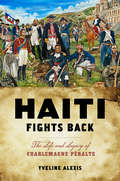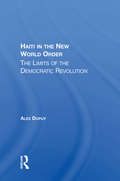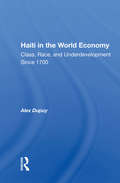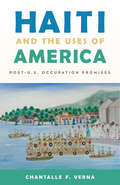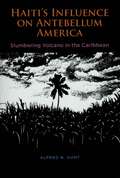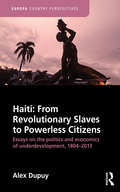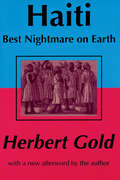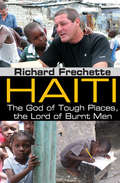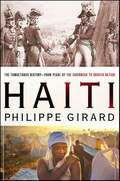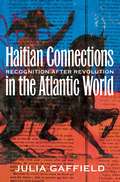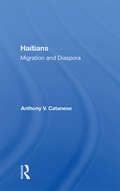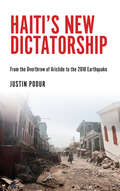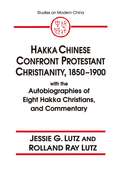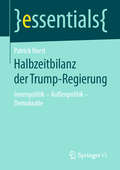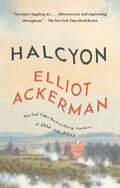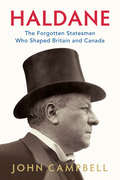- Table View
- List View
Hainan - State, Society, and Business in a Chinese Province (China Policy Series)
by Kjeld Erik BrødsgaardThis book examines the complex relationship between the state, society and business in China, focusing on the experience of the island province of Hainan. This island, for many years a provincial backwater, was given provincial rank in 1988 and became the testing ground for experiments of an economic, political, and social nature that have received great attention from Beijing, in particular the "small government, big society" project. This book provides a full account of this transition, showing how Hainan casts important light on a number of highly topical issues in contemporary China studies: central-local relations, institutional reform, state-society relations, and economic development strategies. It provides detailed evidence of how relations between party cadres, state bureaucrats, businesses, foreign investors and civil society play out in practice in China today. It argues that despite the liberalization of recent years, especially in the economic sphere, the party state remains the most powerful actor in Chinese society, and that path-breaking reform experiments such as in Hainan remain highly vulnerable due to the central government’s hesitation to commit the resources and unequivocal political support needed for the experiments to be successfully realized.
Hair and Fibers (Forensic Evidence Ser.)
by Jane Singer John D WrightThis introductory text on labour economics covers topics such as: the shift in America from a manufacturing-based economy to a service economy; the changes in the economic conditions in the US; the implications of NAFTA and GATT; and the labour markets.
Haircuts by Children and Other Evidence for a New Social Contract (Exploded Views Ser.)
by Darren O'DonnellA cultural planner's immodest proposal: change how we think about children and we just might change the world. We live in an ‘adultitarian’ state, where the rules are based on very adult priori- ties and understandings of reality. Young people are disenfranchised and power- less; they understand they’re subject to an authoritarian regime, whether they buy into it or not. But their unique perspectives also offer incredible potential for social, cultural and economic innovation. Cultural planner and performance director Darren O’Donnell has been collaborating with children for years through his company, Mammalian Diving Reflex; their most well-known piece, Haircuts by Children (exactly what it sounds like) has been performed internationally. O’Donnell suggests that working with children in the cultural industries in a manner that maintains a large space for their participation can be understood as a pilot for a vision of a very different role for young people in the world – one that the UN Committee on the Rights of the Child considers a ‘new social contract.’ Haircuts by Children is a practical proposal for the inclusion of children in as many realms as possible, not only as an expression of their rights, but as a way to intervene in the world and to disrupt the stark economic inequalities perpetuated by the status quo. Deeply practical and wildly whimsical, Haircuts by Children might actually make total sense. ‘No other playwright working in Toronto right now has O’Donnell’s talent for synthesizing psychosocial, artistic and political random thoughts and reflections into compelling analyses ... The world (not to mention the theatre world) could use more of this, if only to get us talking and debating.’ – The Globe and Mail
Hairdresser or Footballer: Bridging the gender gap in schools
by Ross Morrison McGill Hollie AndertonTeaching is a profession where we are persistently trying to ensure that our children have the best possible future, yet gender is still a huge hurdle in terms of expectations. We are setting children up to fail because society instills certain messages in them that can often stop them from achieving what they desire and as teachers, we aren't always opposing them. Often, teachers are so removed from this issue that they don't see it going on in their classroom.
Hairdresser or Footballer: Bridging the gender gap in schools
by Ross Morrison McGill Hollie AndertonTeaching is a profession where we are persistently trying to ensure that our children have the best possible future, yet gender is still a huge hurdle in terms of expectations. We are setting children up to fail because society instills certain messages in them that can often stop them from achieving what they desire and as teachers, we aren't always opposing them. Often, teachers are so removed from this issue that they don't see it going on in their classroom.
Hairy Hippies and Bloody Butchers: The Greenpeace Anti-Whaling Campaign in Norway
by Juliane RieseIn the popular imagination, no issue has been more closely linked with the environmental group Greenpeace than whaling. Opposition to commercial whaling has inspired many of the organization's most dramatic and high-profile "direct actions"-as well as some of its most notable failures. This book provides an inside look at one such instance: Greenpeace's decades-long campaign against the Norwegian whaling industry. Combining historical narrative with systems-theory analysis, author Juliane Riese shows how the organization's self-presentation as a David pitted against whale-butchering Goliaths was turned on its head. She recounts how opponents successfully discredited the campaign while Greenpeace struggled with internal disagreements and other organizational challenges, providing valuable lessons for other protest movements.
Haiti After the Earthquake
by Paul FarmerOn January 12, 2010 a massive earthquake laid waste to Port-au-Prince, Haiti, killing hundreds of thousands of people. Within three days, Dr. Paul Farmer arrived in the Haitian capital, along with a team of volunteers, to lend his services to the injured.In this vivid narrative, Farmer describes the incredible suffering--and resilience--that he encountered in Haiti. Having worked in the country for nearly thirty years, he skillfully explores the social issues that made Haiti so vulnerable to the earthquake--the very issues that make it an "unnatural disaster." Complementing his account are stories from other doctors, volunteers, and earthquake survivors.Haiti After the Earthquake will both inform and inspire readers to stand with the Haitian people against the profound economic and social injustices that formed the fault line for this disaster.
Haiti After the Earthquake
by Paul FarmerOn January 12, 2010 a major earthquake struck near Port-au-Prince, Haiti. Hundreds of thousands of people died, and the greater part of the capital was demolished. Dr. Paul Farmer, U. N. deputy special envoy to Haiti, had worked in the country for nearly thirty years, treating infectious diseases like tuberculosis and AIDS. No one understood better than he how painful it was that Haiti, the site of so much suffering, would have to endure another disaster. It was, in his words, a “cruel cosmic joke. ” Farmer and former President Bill Clinton, the U. N. special envoy to Haiti, had just begun to work on an extensive development plan to improve living conditions in Haiti. Now their project was transformed into a massive international rescue and relief effort. In his own words, Farmer documents this effort, including the harrowing obstacles and the small triumphs. Support came in the form of dozens of humanitarian groups and a flood of money. Despite this outpouring of aid, the challenges were astronomical. U. N. plans were crippled by Haiti’s fragile infrastructure and the death of U. N. staff members who had been based in Port-au-Prince. As the humanitarian operations grew, questions about their effectiveness mounted. By some estimates, Haiti had more NGOs per capita than any other place on earth. And yet, Haitians were still suffering from a lack of basic services, from a lack of food, water, and shelter. Farmer shows how the earthquake heightened the problems in Haiti and argues that these long-term challenges cannot be ignored. In chronicling the relief effort, Farmer draws attention to the social issues that made Haiti so vulnerable to this natural disaster. Now that their already weak public-health system has been further damaged, Haiti’s poor are even more vulnerable to fresh onslaughts of diseases like cholera and typhoid. Yet Farmer’s account is not a gloomy catalog of impenetrable problems. As devastating as Haiti’s circumstances are, its population manages to keep going. Farmer shows how, even in the barest camps, Haitians organize themselves, creating small businesses such as beauty parlors. His narrative is interwoven with stories from Haitians themselves, from doctors and others working on the ground. Ultimately this is a story of human endurance and humility in difficult circumstances. Once again, Paul Farmer reveals what can be accomplished in the face of seemingly overwhelming odds.
Haiti Fights Back: The Life and Legacy of Charlemagne Péralte (Critical Caribbean Studies)
by Yveline AlexisHaiti Fights Back: The Life and Legacy of Charlemagne Péralte is the first US scholarly examination of the politician and caco leader (guerrilla fighter) who fought against the US military occupation of Haiti. The occupation lasted close to two decades, from 1915-1934. Alexis argues for the importance of documenting resistance while exploring the occupation’s mechanics and its imperialism. She takes us to Haiti, exploring the sites of what she labels as resistance zones, including Péralte’s hometown of Hinche and the nation’s large port areas--Port-au-Prince and Cap-Haïtien. Alexis offers a new reading of U.S. military archival sources that record Haitian protests as banditry. Haiti Fights Back illuminates how Péralte launched a political movement, and meticulously captures how Haitian women and men resisted occupation through silence, military battles, and writings. She locates and assembles rare, multilingual primary sources from traditional repositories, living archives (oral stories), and artistic representations in Haiti and the United States. The interdisciplinary work draws on legislation, cacos’ letters, newspapers, and murals, offering a unique examination of Péralte’s life (1885-1919) and the significance of his legacy through the twenty-first century. Haiti Fights Back offers a new approach to the study of the U.S. invasion of the Americas by chronicling how Caribbean people fought back.
Haiti In The New World Order: The Limits Of The Democratic Revolution
by Alex DupuyThis book, a critical study of Haiti's place in the "New World Order," examines the limits of its "democratic revolution" and the prospects for social change. Exploring why the successive military governments in power between 1986 and 1990 were unable to implement the neoliberal economic reforms sanctioned by the World Bank and USAID, Dupuy also an
Haiti In The World Economy: Class, Race, And Underdevelopment Since 1700
by Alex DupuyThis book seeks to explain the causes of Haiti's underdevelopment since the end of the seventeenth century. During the 1960s and 1970s several original paradigms emerged to explain the causes and persistence of underdevelopment in Latin America and the Caribbean. In the renewed effort to understand the associated processes of development and underd
Haiti and the Uses of America: Post-U.S. Occupation Promises
by Chantalle F. VernaContrary to popular notions, Haiti-U.S. relations have not only been about Haitian resistance to U.S. domination. In Haiti and the Uses of America, Chantalle F. Verna makes evident that there have been key moments of cooperation that contributed to nation-building in both countries. In the years following the U.S. occupation of Haiti (1915-1934), Haitian politicians and professionals with a cosmopolitan outlook shaped a new era in Haiti-U.S. diplomacy. Their efforts, Verna shows, helped favorable ideas about the United States, once held by a small segment of Haitian society, circulate more widely. In this way, Haitians contributed to and capitalized upon the spread of internationalism in the Americas and the larger world.
Haiti's Influence on Antebellum America: Slumbering Volcano in the Caribbean
by Alfred N. HuntThe Haitian Revolution began in 1791 as a slave revolt on the French colonial island of Saint Domingue and ended thirteen years later with the founding of an independent black republic. Waves of French West Indians -- slaves, white colonists, and free blacks -- fled the upheaval and flooded southern U.S. ports -- most notably New Orleans -- bringing with them everything from French opera to voodoo. Alfred N. Hunt discusses the ways these immigrants affected southern agriculture, architecture, language, politics, medicine, religion, and the arts. He also considers how the events in Haiti influenced the American slavery-emancipation debate and spurred developments in black militancy and Pan-Africanism in the United States. By effecting the development of racial ideology in antebellum America, Hunt concludes, the Haitian Revolution was a major contributing factor to the attitudes that led to the Civil War.
Haiti: Essays on the Politics and Economics of Underdevelopment, 1804-2013 (Europa Country Perspectives Ser.)
by Alex DupuyThis title focuses on Haiti from an international perspective. Haiti has endured undue influence from successive French and US governments; its fragile 'democracy' has been founded on subordination to and dominance of foreign powers. This book examines Haiti's position within the global economic and political order, and how the more dominant members of the international community have, in varying ways, exploited the country over the last 200 years.
Haiti: Selected Issues
by International Monetary FundA report from the International Monetary Fund.
Haiti: The God Of Tough Places, The Lord Of Burnt Men
by Herbert GoldFive decades ago, award-winning author Herbert Gold traveled to Haiti on a Caribbean version of the Fulbright Scholarship. The journey proved to be a turning point in his life. Fifty years later, his attachment to the tiny Caribbean nation-his second home-remains as passionate and powerful as ever. Now, in Best Nightmare on Earth, he explores the secret life of this vibrant, volatile, violent land. -Beautiful...bizarre...dangerous...exotic, a Garden of Eden fallen into despair, a tiny nation of unimaginable misery and unpredictable grace, an island where life is a kind of literature, a world of -unlimited impossibility.- This is Herbert Gold's Haiti, a country of extraordinary paradox and remarkable extremes-of gingerbread dream houses and wretched slums, of brutal repression and explosive creative energy. Where else, he asks, can you run into evil spirits on the back roads, or find the goddess of fertility and orgasm represented by a photo of a tap-dancing Shirley Temple? Where else is there such generosity amid such corruption, such humor in the midst of such desperation? In his many Haitian travels, Gold has dined with Graham Greene and chatted with the hated Duvalier oppressors. He has traded stories with CIA saboteurs, former Nazis, rum-soaked diplomats, and voodoo priests. He has taken in the cockfights and hunted for pirate treasure. He has nearly died of malaria; he has faced machete-wielding gangs of Ton-Ton Macoutes. He followed the traffic in Haitian blood to American hospitals and watched the AIDS epidemic take its toll. He listened to the steady beat of drums rolling down mist-shrouded mountains, and shared in the flirting, drinking, and laughter of the streets. He has captured the essence of this land where tragedy is the music the people dance to. Herbert Gold reflects on the country's history and politics, culture and folklore, but sees much more. He sees Haiti through the eyes of a lover: impassioned, jealous, probing, ever alert, and alive. This book will be of interest to travelers to, and people interested in the problems of, Haiti and the Caribbean; and collectors of Haitian art.
Haiti: The God of Tough Places, the Lord of Burnt Men
by Herbert GoldAs a priest and a physician, Richard Frechette has known the body, heart, and soul of people in the most anguishing of circumstances. He has carried out his double ministry over the past twenty-five years in settings of extreme poverty, violence, social upheaval, and natural disasters. This personal experience of tough realities has been at once a descent into chaos and an ascent into compassion, never more so than in his work in Haiti.The reflections in this volume are less about Haiti than they are about real-life incidents that happened there, during a particular time in history. In a fuller sense, these reflections shed light on what happens in any place, at any time, to people of any race or class, who live out an assault on their human dignity. Whenever the dignity of human beings is marred, the human spirit finds itself in threatened conditions, and seeks desperately to preserve what is human about it. This is the unfailing light of God's grace, ever present and faithful, fiercely persistent in trying to renew the face of the earth and the pilgrim human heart.Grounded in space and time, and yet speaking of universal concerns, this very personal volume shows how the ancient human scourges of poverty, ignorance, illness, and violence desecrate humanity and weaken the spirit. Yet as Frechette shows, from these ashes many people, with the help of God, valiantly rise. This is a stunning work that crosses conventional barriers between the personal and the political, between degradation by others and elevation by selves."I will lead you by the way.... that you may become the brother of God and learn to know the Christ of the burnt men." Thomas Merton
Haiti: The Tumultuous History—From Pearl of the Caribbean to Broken Nation
by Philippe GirardWhy has Haiti been plagued by so many woes? Why have multiple U.S. efforts to create a stable democracy in Haiti failed so spectacularly? Philippe Girard answers these and other questions, examining how colonialism and slavery have left a legacy of racial tension, both within Haiti and internationally; Haitians remain deeply suspicious of white foriegners' motives, many of whom doubt Hatians' ability to govern themselves. He also examines how Haiti's current political instability is merely a continuation of political strife that began during the War of Independence (1791-1804). Finally, Haiti: The Tumultuous History, Girard explores poverty's devastating impact on contemporary Haiti and argues that Haitians--particularly home-grown dictators--bear a big share of the responsibility for their nation's troubles.
Haitian Connections in the Atlantic World
by Julia GaffieldOn January 1, 1804, Haiti shocked the world by declaring independence. Historians have long portrayed Haiti's postrevolutionary period as one during which the international community rejected Haiti's Declaration of Independence and adopted a policy of isolation designed to contain the impact of the world's only successful slave revolution. Julia Gaffield, however, anchors a fresh vision of Haiti's first tentative years of independence to its relationships with other nations and empires and reveals the surprising limits of the country's supposed isolation.Gaffield frames Haitian independence as both a practical and an intellectual challenge to powerful ideologies of racial hierarchy and slavery, national sovereignty, and trade practice. Yet that very independence offered a new arena in which imperial powers competed for advantages with respect to military strategy, economic expansion, and international law. In dealing with such concerns, foreign governments, merchants, abolitionists, and others provided openings that were seized by early Haitian leaders who were eager to negotiate new economic and political relationships. Although full political acceptance was slow to come, economic recognition was extended by degrees to Haiti--and this had diplomatic implications. Gaffield's account of Haitian history highlights how this layered recognition sustained Haitian independence.
Haitians: Migration And Diaspora
by Anthony V. CataneseIn 1981 I was asked by some DePauw University students to serve as faculty adviser for a group planning to work in rural Haiti during the nearly month-long interim term. I accepted the offer for several reasons. I had enjoyed being the faculty adviser for two previous work projects in Guatemala and Jamaica. I had found the experience was educationally valuable for undergraduates, and I could use it to enhance classroom learning during the semester. In addition, the experience of living and working in a radically different environment was intellectually stimulating for me as a social scientist interested in welfare economics. Finally, because such volunteer projects were rare in the early 1980s, I realized the opportunity should not be passed up. It was a chance to see a part of the world I had heard of but knew little or nothing about except from accounts found in newspaper and magazine articles.
Haiti’s New Dictatorship: The Coup, the Earthquake and the UN Occupation
by Justin PodurIn 1804 Haiti became the world’s first independent Black republic following a slave revolution. Two hundred years later, ravaged by colonialism and corrupt elites, it was placed under a UN military occupation. Haiti’s New Dictatorship is the history of the past seven years, from the 2004 coup against Aristide to the devastating 2010 earthquake,revealing a shocking story of abuse and neglect by international forces. Justin Podur reveals the reality of a supposedly benign international occupation, arguing that the denial of sovereignty is the fundamental cause of Haiti’s problems. A powerful challenge and wake-up call to the international NGO and development community, Haiti’s New Dictatorship is essential reading for anyone concerned with justice in the global south and progressive development policies.
Hakka Chinese Confront Protestant Christianity, 1850-1900: With the Autobiographies of Eight Hakka Christians, and Commentary
by Jessie Gregory Lutz Rolland Ray LutzThis work focuses on the 19th-century mission conducted by Chinese evangelists among the Hakka, an ethnic minority in south China. The principal part of the text comprises the autobiographies of eight pioneer missionaries who offer insight into village life and customs of the Hakka people.
Halbzeitbilanz der Trump-Regierung: Innenpolitik - Außenpolitik - Demokratie (essentials)
by Patrick HorstKein Präsident war zur Halbzeit seiner Präsidentschaft jemals so unpopulär wie Donald J. Trump – dabei zugleich aber ausgesprochen populär unter Republikanern. Im Urteil der Experten gehört Trump mit Andrew Johnson und James Buchanan zu den drei schlechtesten US-Präsidenten aller Zeiten. Trumps innenpolitische Halbzeitbilanz war mager und seine außenpolitische Wirkung war ein Fiasko. Katastrophal war Trumps Regierungstechnik. Sie bestand vor allem in populistischen Attacken auf die demokratischen Institutionen. Die US-Demokratie erodierte weiter, ohne jedoch bereits in den Autoritarismus abzugleiten.
Halcyon: A novel
by Elliot AckermanA daring new novel, at once timely and timeless, set around an American family and the ever-shifting sands of history and memory and legacy that define them (&“An expert juggling act.&” —Stephen Markley, New York Times Book Review)Martin Neumann, recently divorced, is living at Halcyon, the Virginia estate of renowned lawyer, family patriarch, and World War II hero Robert Ableson. It&’s 2004, and Gore is entering his second term as president, when news breaks that scientists have discovered a cure for death. Suddenly, Martin is forced to question everything he thought he understood about the world around him. Who is Ableson, really? Why has Martin been drawn into the Ablesons&’ most closely guarded family secrets? Is this new science a miraculous good or an insidious evil?From pivotal elections to crumbling marriages, from the Civil War to the Battle of Saipan, Halcyon is a profound and probing novel that grapples with what history means, who is affected by it, and how the complexities of our shared future rest on the dual foundations of remembering and forgetting.
Haldane: The Forgotten Statesman Who Shaped Britain and Canada
by John CampbellCan you name the creator of the Territorial Army, the British Expeditionary Force, the Imperial General Staff, and the Officers' Training Corps? The man who laid the foundation stones of MI5, MI6, the RAF, the LSE, Imperial College, the "redbrick" universities, and the Medical Research Council? This book restores Richard Burdon Haldane to his rightful place among the great men of British and Canadian history. Serving as war minister in the 1905 Liberal British government, his groundbreaking proposals on defence, education, and government structure were astonishingly ahead of his time – the very building blocks of modern Britain. Even the Canadian Constitution, as now interpreted, is unthinkable without Haldane. His ubiquitous networks ranged from Wilde to Einstein, Churchill to Carnegie, king to kaiser; his polymathic interests enabled pioneering cross-party, cross-sector cooperation. Yet in 1915 he was ejected from the Lord Chancellorship, unjustly vilified by an ignorant press campaign as a German sympathizer. John Campbell charts these ups and downs, reveals the intensely personal side of Haldane through previously unpublished love letters, and shows his enormous relevance in our search for just societies and states today. Amidst political and national instability, it is surely now right to reinstate Haldane as an outstanding example of true statesmanship.
